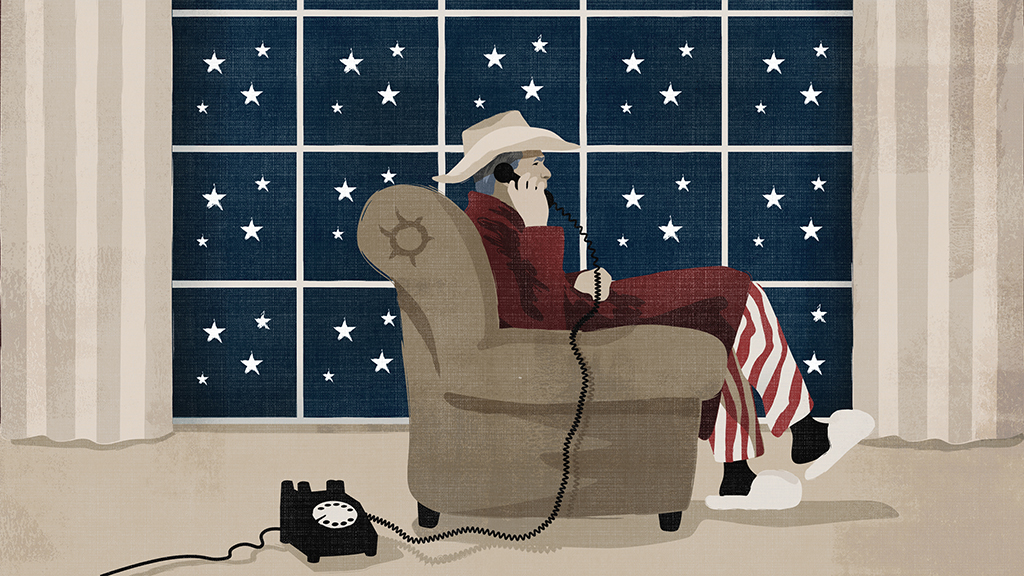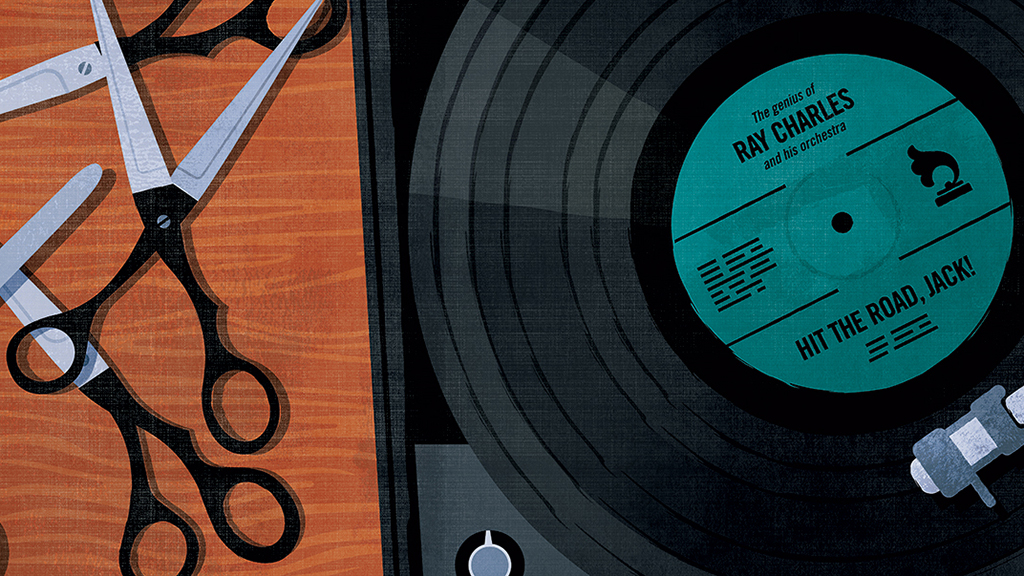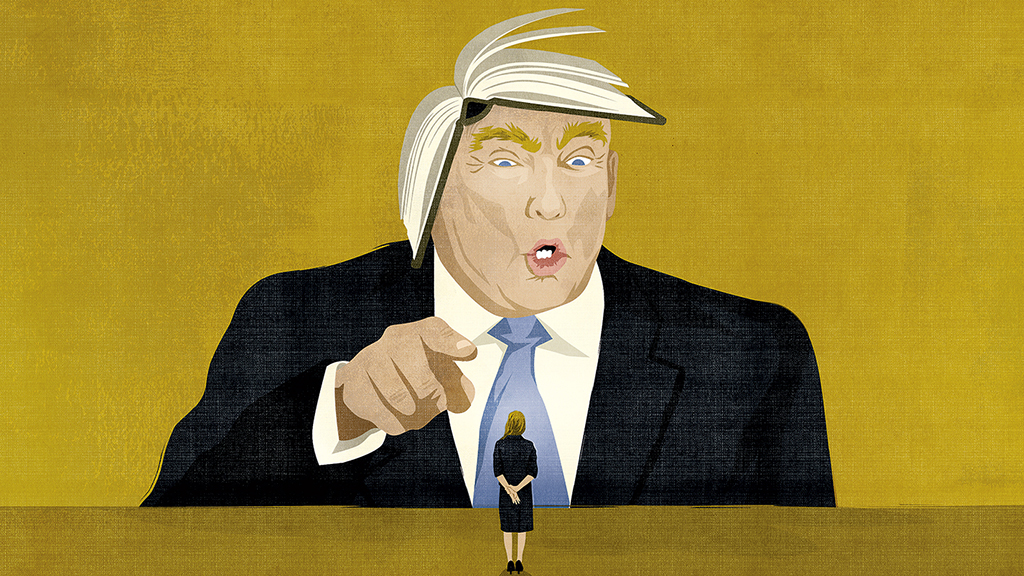This piece is part of the Trump Fiction Project from our December 2017 issue. To explore more of “Our Year of Trump,” a look at how our city has dealt with 12 exhausting months, click here.
The day before their field trip, Miss Oleynik had her kindergarten class sit in a circle and share holiday traditions. Most of them talked about reindeer and chimneys. Hernando, Timothy’s best friend, brought a piñata shaped like a star, and Timothy said his family did things just like everyone else, but when his mother had been a little girl in Russia, she had decorated a New Year tree instead of a Christmas tree. All the kids laughed and Timothy felt happy, but at recess no one would play with him anyway, not even Annie. Usually he let it pass, but now, emboldened by his earlier success, he cornered Annie by the slide and asked her why she didn’t like him anymore.
“I like you,” she said, glancing around, “but you play with Hernando, and Kyle says Hernando eats grasshoppers and his father is . . . .” She lowered her voice. “Illegal.”
“What’s that?”
“I don’t know, but Kyle heard his parents talking and it’s not good to be. Like, it’s a bad word or something.”
“I see,” Timothy said, but he didn’t.
The next day, before they boarded the bus, Miss Oleynik told them again how they should feel special because most kids didn’t get to visit the President’s home or see his Christmas tree—not the big one outside, which anyone could look at, but his private tree inside. Timothy wanted to feel special—his mother had dressed him in his favorite jacket and given him a camera so he could take a picture of the special tree, which she would frame for his wall—but at the moment he just felt worried. Once he was on the bus, he put his arm across the seat next to him and told Hernando it was taken.
“There’s no one in it,” Hernando said.
“It’s taken,” Timothy repeated, and stared out the window.
“Whatever. I don’t want to sit here anyway. And your mother’s New Year trees are stupid.”
“Oh, yeah? And you eat bugs,” Timothy said, breathing fast.
“Children, move along, take your seats!” Miss Oleynik called from the front.
When Hernando strode off, Kyle giggled and plonked down next to Timothy and offered him a stick of gum. Timothy took it, even though he didn’t like gum—he didn’t like Kyle, either. Halfway through the ride, he decided to ask Hernando if they could maybe sit together on the return trip. But when they arrived, they had to line up and Hernando was all the way in the back. Then they were filing through a gate, past a uniformed man with a cool badge. The President’s house seemed kind of boring, with no turrets or moats or anything, and Timothy had just turned to gape at the man with the badge when he saw Hernando pull at the man’s sleeve, point at Timothy over the others’ heads, and say in a hard, clear voice, “His mother is a Russian spy.”
The man looked at Timothy with narrowed eyes, but they were already being ushered through the door. Inside, the floors were really shiny, and lots of lights made it hard to see anything clearly. Kyle grabbed Timothy’s camera and started pointing at guards’ feet and curtains and ceilings, clicking and laughing stupidly, then threw the camera back to him with all the pictures used up. Timothy felt upset, but when they came to the President’s tree, he saw no ornaments made by kids or souvenirs from around the country, like what Miss Oleynik had promised, only small golden men swinging sticks and hundreds of hard white balls. “The golf theme—how nice,” Miss Oleynik exclaimed, but her voice had a secret compartment to it, like Timothy’s own voice did when he was lying.
He decided he didn’t want a photo of this tree anyway and was just putting the camera away when someone said, “Timothy Miller? And you, Miss —”
“Oleynik.” She sounded nervous.
“Riiight,” the man said as he consulted some papers. “Please come with me.”
“Cool,” said Kyle. “You’re getting a private tour.”
They took Timothy to a room with no windows, then led Miss Oleynik down another corridor. Her back looked strange, almost like she was crying. Two men in suits came in and talked at Timothy. They kept calling him “son,” but their voices weren’t kind. Does your mother mention the President, son? Oh, she gave you this camera, did she, son? After a while, another man brought in a stack of photos. Did you mother tell you to photograph the guards and the windows? Is she proputin or antiputin? Does she have chin-chin sympathies? He wanted to tell them his mother worked in a mall toy store and made the best pancakes, but he was tired and needed to pee, so he just answered yes and no at random. He didn’t understand the questions anyway.
It was night when he was finally allowed outside. His father waited beyond the gate, his face set at an odd angle. They were silent driving home. When they got there, Timothy’s mother was gone. His father said she had to leave on a little trip, but all her shoes were still there, Timothy checked—he liked to play in her closet and knew all her pairs. She had promised to decorate the Christmas tree with him, so he was upset for the rest of the week. Kindergarten was now boring, too. Miss Oleynik hadn’t come back, and the new teacher spoke in a monotone and avoided Timothy’s eyes. The following Thursday, Timothy’s father didn’t return from work—he’d gone on a little trip, Timothy’s grandmother said when she came up from Texas to take him back with her. At first, Timothy felt sad, but she baked him lots of cookies during the holiday season, and in January she gave him a terrific black Labrador puppy.
“You’ll grow up here together, see?” she said, then cried for no reason.
This article appears in the December 2017 issue of Washingtonian.











